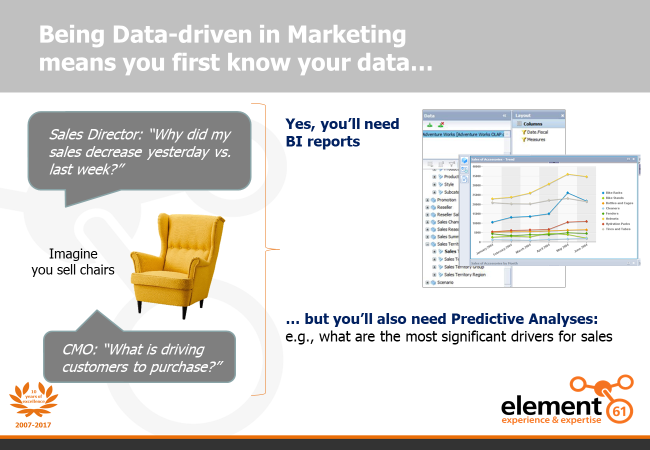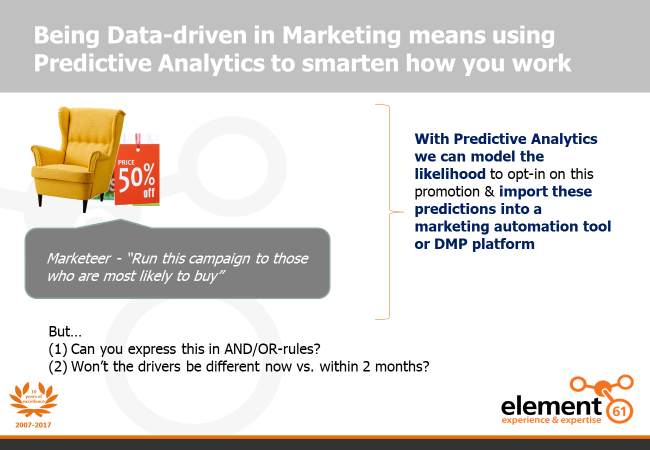Marketing, a front-runner in the adoption of data & analytics?
Marketing has been one of the most innovative areas in terms of Data & Predictive Analytics. Driven by digitization, it has been a functional area where data tools are already omni-present for many years. This in contrast with today’s disruptive areas such as Industry 4.0 & HR where only now (first things first) data-tracking is taken seriously.
As a result, most organizations today already leverage digital tracking solutions (Google Analytics or Adobe Analytics), leverage a customer journey tool (such as Selligent or Adobe Campaign) and run smart retargeting using their DSP (Programmatic Demand Side Platform) or Adwords retargeting pixels.
Reality is, however, that most Marketers still highlight data an underused asset. Although digital marketing is a data-driven area, most organizations struggle leveraging data smartness in their entire digital marketing– for example: all customer journey tools and DMPs are only rules-based and thus limited to a delineated to heuristics set by a marketer.
The role of Predictive Analytics in Digital Marketing
To inspire marketers on the day after tomorrow, we hosted a couple of weeks ago an executive event on Predictive Analytics in Sales & Marketing. We believe Predictive Analytics/Machine Learning has two unique roles to play for Digital Marketers:
(1) Get better insights
If you reflect on how we all use reports today, we quickly see the limits of reporting: today, we analyse based on our assumptions & we are limited to analysing only 2 or 3 dimensions at once – e.g. sales per product per region.
Predictive Analytics can help look beyond what we know, run analysis across on more dimensions than humans can deal with & automatically extract most important drivers
Figure 1 - Predictive Analytics helps you to get better insights

click to enlarge
(2) Run smarter Marketing Automation
Today’s Sales & Marketing tools are limited to rule-based triggers (if people buy X, email them offer on product Y) while certain behaviour is hard to define into rules (e.g. churn, likely to buy promotion Z).
Predictive Analytics can automate & smarten this process and trigger your sales & marketing automations platforms (e.g. Salesforce, Selligent) based on past learnings: “Offer this customer promotion Y which she’s likely to buy” run display bannering through Google Adwords & Facebook.
Figure 2 - Predictive Analytics helps you run better marketing campaigns

click to enlarge
The business impact of the first is better decision making. The business impact of the latter is direct efficiency & can be huge: rather than emailing or bannering the entire population, you can target just those leads likely to convert. It saves costs, avoids marketing blindness and increases conversion rates.
A simple example: targeted emailing
Let’s take a typical retailer as an example and let’s imagine you want to run a special discount promotion. There are several approaches one could take:
- One approach could be to e-mail the full CRM base
- Another approach could be to target only those customers who also bought last year.
- A third option is to target ‘look like’ customers who look like those customers who bought a design chair last year but didn’t yet.
This ‘look-a-like’ profile is trivial to define in boolean rules as it might be based a specific socio-demographic characteristic, on & offline behaviour but similarly past purchases. Rather than building this through rules, predictive analytics can help you model look-a-likes. This means it will analyse across all historical information what characterizes people likely to buy this product and calculate the likelihood for each individual lead. Those leads with a high likelihood can be targeted with this special promotion e-mail.
"The more we thought about it, the more complex the set of business rules became, so in the end we used machine learning" - quote from K. Duijndam from KLM in this Google article.
Leveraging predictive analytics (i.e. machine learning) can easily be used to smartly target run digital marketing campaigns
- ... on customers with changing purchase behaviour (X-sell modeling)
- ... on customers who are likely to cancel their contract (churn modeling)
- ... on leads who are likely to buy (lead generation modeling)
Shall we help you run your digital marketing campaigns more targeted?
